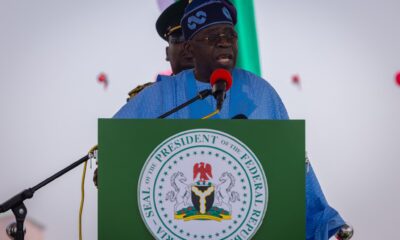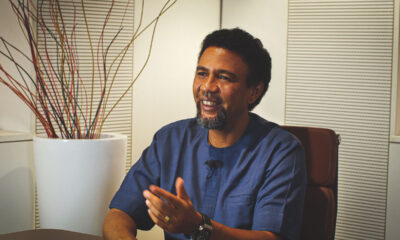Society
Details: WHO Explains Nigeria Not Barred From Accessing Covid-19 Vaccines

The World Health Organisation (WHO) said on Saturday that Nigeria and other African countries were not barred from accessing COVID-19 vaccines through the Global Assess Facility, COVAX.
COVAX, a WHO-backed programme, was set up to divide a billion doses of COVID-19 vaccines across 92 low and middle-income countries.
Speaking at a press briefing on Saturday, WHO Country Representative in Nigeria, Walter Mulombo, said the international health agency is supporting all countries to access vaccines as quickly as possible.
Mr Mulombo’s statement was a response to the reactions that trailed an earlier announcement by the WHO that only four of 13 African countries were qualified to receive the first batch of the Pfizer and bioNtech vaccines. He said the WHO was committed to helping all African countries get COVID-19 vaccines.
“WHO has not disqualified any country in Africa from accessing COVID-19 vaccines through the COVAX facility, but rather is supporting all countries to access vaccines as quickly as possible,” Mr Mulombo said.
“Currently, all countries on the continent are expected to start accessing the AstraZeneca/Oxford vaccines by the end of February. The vaccine is under review by WHO for Emergency Use Listing and the outcome is expected soon.”
PREMIUM TIMES earlier reported how the Regional Director of the World Health Organisation (WHO), Matshidiso Moeti, said only four of 13 African countries were shortlisted to receive 320,000 doses of Pfizer and BioNTech vaccines. Nigeria did not make this list.
Ms Moeti said the countries – Cape Verde, Rwanda, South Africa and Tunisia – were picked following evaluations by a multi-agency committee based on current mortality rates, new cases and trends, and the capacity to handle the ultra-cold chain needs of the vaccine.
She, however, said countries that failed to make the Pfizer first list could get the Oxford-AstraZeneca vaccines later in the month.
COVAX
Most African countries, including Nigeria, are banking on benefitting from the COVAX programme, which promised access to vaccines for up to 20 per cent of participating countries’ population with an initial supply beginning in the first quarter of the year to immunise three per cent of their populations.
“The #COVAX Facility is aiming to reach at least 20 per cent of Africans, which will require delivery of up to 600 million doses this year,” Ms Moeti said.
Through the COVAX initiative, the Nigerian government had in December announced that it would receive an initial 100,000 doses of the Pfizer and bioNtech vaccines in January. It later announced that the vaccines will no longer arrive until February.
Barely five days ago, a government official said Nigeria will no longer receive the Pfizer vaccines but will receive 16 million doses of the AstraZeneca COVID-19 vaccines before the end of February.
“This will replace the earlier communicated 100,000 doses of Pfizer mRNA vaccine, which was grossly inadequate,” the Executive Director of the National Primary Health Care Development Agency (NPHCDA), Faisal Shuaib, had said.
Nigeria is ready
In his remarks Saturday, Mr Shuaib said there were several factors considered in allocating the 320,000 doses of Pfizer vaccines allocated to the four African countries.
“It is clear that countries such as South Africa which received the Pfizer allocation have the new strain of the COVID-19 virus, has the highest mortality rates and is struggling to contain transmission.
“Furthermore, giving smaller countries such as Cape Verde and Rwanda few doses of the Pfizer vaccine would have a larger public health impact considering their population size,” Mr Shuaib said.
“100,000 doses to Nigeria, we have all agreed would have been a drop in the ocean. So, it is a welcome development that we are receiving 16 million doses of the Astrazeneca vaccine to replace the Pfizer vaccine in the same month of February.”
He said the expected doses will invariably help the country reach more of its population.
Nigeria recently acquired three ultra-cold freezers which Mr Shuaib had described as “enough” capacity needed to store doses of the Pfizer vaccines earlier expected.
“Each of this ultra-cold freezer has 700 litres capacity, that is a total of 2,100 capacity. The requirement for the 100,000 doses of Pfizer vaccines that will be available by the end of January/February is 500 litres, so we have enough capacity for the 100,000 doses,” Mr Shuaib said last month while addressing PREMIUM TIMES and other journalists at the facility.
He also said the plan is not to over-invest in the expensive ultra-cold chain equipment given that other vaccines can be kept between +2 and +8 degree Celsius.
The Oxford-AstraZeneca vaccine, which has 70 per cent efficacy, offers the best possibility for distribution in Nigeria because the temperature required is not as low as the Pfizer vaccine and manufacturers can produce it at a lower price.












